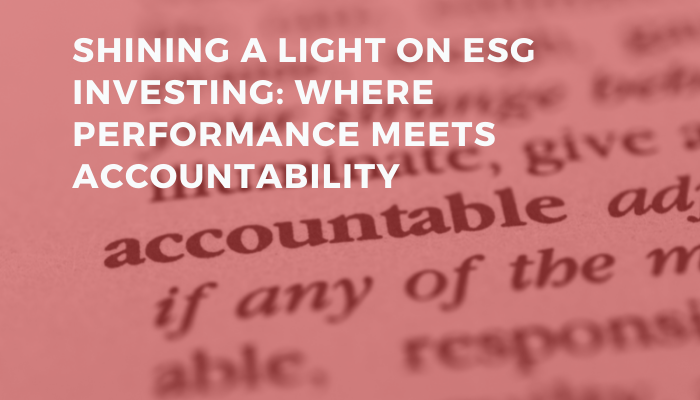
As BlackRock’s former sustainable investing chief, Tariq Fancy, opines about ESG “greenwashing,” he definitely is raising some eyebrows in the financial world.
The focus on ESG as mainstream investing, he warns, is a distraction that may not be having the environmentally woke impact on climate change that many investors are hoping for . He makes a good point.
In many cases ESG investment products labeled as “green” include companies whose commitment to addressing climate change is, at best, suspect.
Shareholders are getting wise to these questionable practices and so is the SEC. The commission’s new Climate and ESG Task Force is expected to call out ESG-labeled investment products that fall short of their claims. As investor awareness grows, the SEC is promising to proactively evaluate and pursue tips, referrals, and whistleblower complaints as they relate to ESG claims. It’s going to be all about accountability.
ESG Metrics and Accountability
For most investors, the lack of standardization in ESG data is the most significant challenge they have to overcome. Those who want to be conscientious with their capital want reliable and accurate data to better evaluate their ESG investing strategies.
There has been progress. The big four accounting firms have recommended environmental, social, and corporate governance metrics for all companies to use as part of their financial reporting processes. At last count, 61 companies, including Unilever, PayPal and Sony, have committed to these metrics. The wild west of ESG standards may soon be tamed.
A widespread commitment to accountability in ESG messaging to consumers would go a long way with the work that is already being done in communicating ESG policies to investors. Investors have considerable leverage to hold companies accountable, especially as ESG investing has grown in popularity.
According to a survey, there was a meaningful increase in corporate ESG Disclosure from 2019 to 2020. The top seven categories that companies focused on were:
- Human capital
- Environmental
- Corporate culture
- Ethical business practices
- Board oversight and Environmental & Social (E&S) issues
- Social impact/community
- E&S issues in shareholder engagement
Social Impact
The focus most often seems to fall on environmental and sustainability issues, overshadowing the other equally important categories. That’s especially true as the Biden Administration refocuses attention on climate change. The aftermath of the pandemic and 2020’s racial injustices, however, is shining a light on the social impact companies can make with their ESG strategies.
Though consumers rely on businesses for information about their current corporate approaches to social issues, ESG messaging is not something that consumers can easily confirm for themselves.
A new trend in corporate social impact is on the rise. The events during the past year are making corporate leaders realize that the focus on diversity and inclusion-related issues cannot be limited to inside a company’s own walls. Rather than simply focusing on diversity in terms of representation in their workforce or their suppliers, corporations are realizing that investing in making all of society more inclusive and equitable is of paramount importance.
Having an inclusive society avoids the costs incurred when people are excluded – from jobs, from businesses and from accessing social services. Providing all of society with the best opportunities to enjoy life and prosper is a source of economic strength.
Here are a few of the benefits of focusing on social impact strategies:
- Improvement in mental and physical health: Social inclusion can counteract isolation and increase community participation, which helps to alleviate health problems, especially mental health issues such as anxiety and depression.
- Reduced cost of social services: Social inclusion reduces the cost of social services by easing pressure on the public health system and reducing the need for income and housing support payments.
- Inclusive growth: By raising wages and workforce participation in geographical areas of socioeconomic disadvantage, the benefits of economic growth can be shared more evenly across all communities.
People, broadly, are taking a closer look at how they can play a part in spreading the word and raising awareness to help make our societies more inclusive and diverse. Each of us can play a role in promoting and advancing an inclusive and integrated society and as evidence of the connection between a company’s social impact and its financial performance continues to grow, the companies ignoring these trends do so at their own peril.


